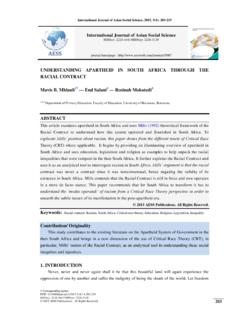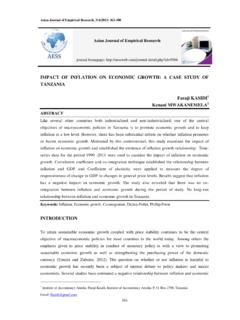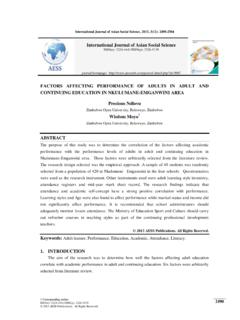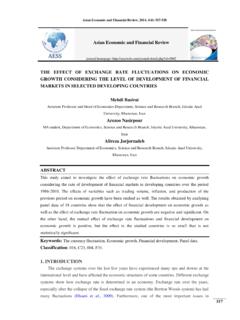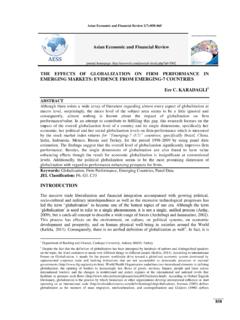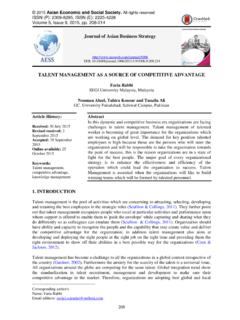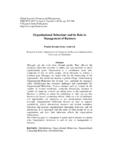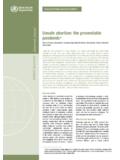Transcription of CHALLENGES OF NEGOTIATING SECTORAL GOVERNANCE …
1 Asian Journal of Economic Modelling, 2014, 2(2): 69-84 69 CHALLENGES OF NEGOTIATING SECTORAL GOVERNANCE OF STREET VENDING SECTOR IN HARARE METROPOLITAN, ZIMBABWE Tavonga Njaya Faculty of Commerce and Law, Zimbabwe Open University, Zimbabwe ABSTRACT Informal businesses have decorated the streets of Harare and have become an increasingly visible and disruptive locus of conflict between the government s efforts to maintain public order on one hand and the citizens efforts to generate income on the other. This study sought to investigate the problems hindering the establishment of a stable GOVERNANCE framework of street vending sector in Harare in Zimbabwe. The study used qualitative were collected through in-depth personal interviews, direct observations and document reviews. Semi-structured questionnaires were administered to 145 street vendors in Harare. The study revealed that the inability to achieve stable GOVERNANCE of street vending may be rooted in problems at the national, metropolitan and local levels.
2 First, policy contradictions caused by conflicting political incentives at different levels of the state have made establishment of SECTORAL GOVERNANCE rather elusive. Second, at the metropolitan level, neoliberal by-laws and regulations continued to exclude street vendors from participating in the economic activities of the country. These by-laws have failed to adapt to the changing circumstances. Third, street vendors lacked formal association(s) that can coordinate strategies across different groups to achieve SECTORAL GOVERNANCE . The study provided an insight into an emerging research area that is characterised by a proliferation of a variety of types of street vendors in Harare. The study showed that while vending associations had been unsuccessful in their efforts to achieve SECTORAL GOVERNANCE , the new interest regime could offer novel strategies of action to achieve this goal.
3 2014 AESS Publications. All Rights Reserved. Keywords: Formalisation, Informality, Regulation, SECTORAL GOVERNANCE , Street vendor, Street economy, Informal sector, Vending. Contribution/ Originality This study is one of very few studies which have investigated CHALLENGES of formalising street vending in Zimbabwe. Street vendors have neither legal right to work nor voice to influence urban planning. Asian Journal of Economic Modelling journal homepage: Asian Journal of Economic Modelling, 2014, 2(2): 69-84 70 1. BACKGROUND OF THE STUDY Street vending as an occupation has existed for hundreds of years (Bromley, 2000) and has become an integral component of most urban economies. In the literature on street vending, street vendors are broadly classified as vendors who sell goods or services in public spaces including sidewalks, alleyways, train stations, buses and public parks. "Street vendor may refer to vendors with fixed stalls, such as kiosks; vendors who operate from semi-fixed stalls, like folding tables, crates, collapsible stands, or wheeled pushcarts that are removed from the streets and stored overnight; vendors who sell from fixed locations without a stall structure, displaying merchandise on cloth or plastic sheets; or mobile vendors who walk or bicycle through the streets as they sell (Roever, 2010).
4 In this study, the term street vendor includes stationary and mobile vendors. Street vendors may be stationary in the sense that they occupy space on the pavements or other public/private spaces or they may be mobile in the sense that they move from place to place by carrying their wares on push carts or in baskets on their heads (Bhowmik, 2005). In this study, the terms street vendor , street trader , hawker and peddler have the same meaning and they are often interchanged. Street vendors are part of a growing informal economy (Flodman-Becker, 2004) who invariably escape compliance with state regulations of their business enterprises. In almost all Asian countries, street vendors have no legal status to conduct their business and they are constantly harassed by the authorities (Bhowmik, 2005). The reasons for the rapid growth of the informal economy in developing countries include limited absorption of surplus labour by agriculture and formal economy; barriers to entry into the formal economy such as excessive costs and government regulations (Hernando, 2000); weak capability of institutions to provide education, training and infrastructure; redundancies during structural programmes; demand for low cost goods and services; globalisation of world economy that tends to privilege capital and disadvantage labour especially lower skilled workers who cannot easily migrate (Roever, 2010);lack of government commitment to support the informal sector; rural-urban migration caused by poverty and the impact of HIV and AIDS and the rising number of women entering the labour markets.
5 In Ghana, Hart (1973) observed that price inflation, inadequate wages and an increasing surplus to the requirements of the urban labour market led to a high degree of informality in the income generating activities of the sub-proletariat. Hart (1973) argued that government planning and the effective application of economic theory in this sphere had been impeded by a wholesale transfer of western categories to the economic and social structures of African cities. The practice of street vending generates enormous controversy (Bromley, 2000) and the core debates revolve around the idea of formalisation. However, there are CHALLENGES to integrating informal businesses into the mainstream economy though the benefits of formalisation are compelling. In Lima, Peru, the historical pattern of informal street vending was transformed through formalization (Bettcher et al., 2009).
6 This involved giving property rights to street vendors, reducing barriers to market entry, introducing cost-effective regulations and democratic policy process. Bettcher et al. (2009) reported that between 1991 and 1994, about 382 100 street businesses belonging mainly to the poor were formalised and contributed US$ million in licence fees and created 550 00 jobs. Roever (2005) observed that intractable conflicts between vendors and government of Peru arose not over Asian Journal of Economic Modelling, 2014, 2(2): 69-84 71 the issue of formalisation per se, but rather over the specific terms of formalisation. She noted that negotiations over the terms of formality were conditioned by changing political circumstances at the national, metropolitan and local levels. As a result different configurations of vendor allies and opponents created strong incentives for hindering enforcement of formalisation measures at the local level (Roever, 2005).
7 In India, street vending organisations campaigned successfully for inclusive practices, national policy and law on street commerce (Chen, 2012). In some countries for example, South Africa, street vending organisations have become very influential over city planning in Durban. In the case of Harare, negotiations over formality are a source of protracted conflict between street vendors and the City Council who have been unable to jointly construct a stable regime of SECTORAL GOVERNANCE . But what are the sources of conflict between the City Council and street traders? How can the City Council and government in general disregard a sector of the economy where the majority of the population is supporting itself? Can the perceived problems of street vending be resolved through formalisation? Are there any strategies towards formalisation of street vending in Zimbabwe?
8 What are the problems hindering the formalisation of street vending sector? These were the overarching questions addressed by the study. The paper is organised as follows. The background of the study and review of related literature have been discussed in this introductory section. Research objectives and corresponding research questions are outlined in section two. The research methodology of the study is explained in section three. Section four presents findings from the study. The conclusion and recommendations are discussed in the last section. 2. STUDY OBJECTIVES The study sought to investigate the problems hindering the establishment of a stable GOVERNANCE framework of street vending sector in Harare in Zimbabwe. The specific objectives of the study were: To identify emerging street vending activities or patterns in Harare. To identify factors promoting street vending in Harare.
9 To evaluate factors hindering the establishment of stable GOVERNANCE framework of street vending sector in Harare. To make suggestions for policy recommendations to enable planning and development of sustainable strategies of formalising street vending in Harare. Research Questions What are the emerging street vending activities or patterns in Harare? What factors are promoting street vending in Harare? What are the factors hindering the establishment of stable GOVERNANCE framework of street vending sector in Harare? What are the policy recommendations that can enable planning and development of sustainable strategies of formalising street vending in Harare? Asian Journal of Economic Modelling, 2014, 2(2): 69-84 72 3. STUDY METHODOLOGY The study used mixed method research (Bryman, 2006) where the qualitative approach predominated over the quantitative approach. The population of the study included all street vendors in Harare.
10 Harare was purposively selected for the study because the City experienced the highest proliferation of street vendors in Zimbabwe. During the 2012 census, Harare recorded the highest population of percent (ZIMSTAT Zimbabwe National Statistics Agency), 2012). Data collection techniques included interviews, focus groups, observations and document reviews. A short questionnaire with most open-ended questions was prepared and administered to 145 street vendors. Street vendors were divided into subpopulations called strata according to location of vending sites. The questionnaire was distributed as follows: 60 street vendors in the six high density suburbs of Budiriro, Highfield, Glen Norah, Glen View, Mufakose and Warren Park; 15 vendors in medium-density suburbs of Zimre Park and Southerton; ten vendors in the low density suburbs of Avondale and Highlands and 60 vendors in the city centre.
